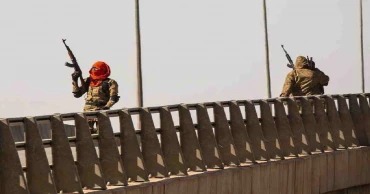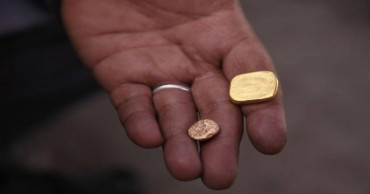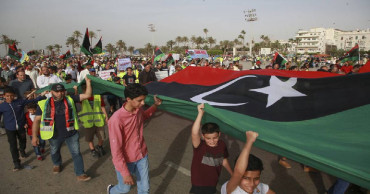extremists
More than 70 soldiers killed in Burkina Faso, extremists say
The Islamic State group has claimed responsibility for killing more than 70 soldiers, wounding dozens and taking five hostage, in an ambush on a military convoy in northern Burkina Faso.
The statement, posted Friday by Amaq, the group’s news agency, said it attacked a convoy trying to advance to areas under its control near Deou, in the Sahel's Oudalan province. It said it seized weapons and chased retreating soldiers for miles into the desert.
Images released by the group show 54 slain bodies in military uniform lying in the bloodstained dirt, as well as more than 50 seized assault rifles and images of the five soldiers it said were taken prisoner.
Read More: Burkina Faso says 66 women, children freed from extremists
The announcement comes one week after the attack in Deou and days after another attack in Tin-Akoff town, where locals and civil society groups say dozens more soldiers and civilians were killed when a military outpost was hit.
It's unclear how many people have been killed in the two incidents. Last week the government confirmed that 51 soldiers died in the Deou ambush but it has not responded to requests for updated numbers or commented on the attack in Tin-Akoff.
Violence linked to al-Qaida and the Islamic State group has wracked the country for seven years killing thousands and displacing nearly 2 million people. Frustration at the government's inability to stem the violence led to two coups last year, each one preceded by a major attack on the military.
This is the deadliest ambush on soldiers since the new junta leader, Capt. Ibrahim Traore, seized power in September and analysts say it could threaten his grip on power.
“There’s a persistent stream of militant attacks north of the country and the public is undoubtedly taking notice of their government's inability to provide security. Any further attacks this colossal could threaten a public scene and even threaten to unseat the junta,” said Laith Alkhouri, CEO of Intelonyx Intelligence Advisory, which provides intelligence analysis.
One soldier involved in the ambush in Deou, who was not authorized to speak to the media, said their convoy was outnumbered as more than 300 jihadis encircled them, firing rockets and mortars. “We lost many men”, he said.
The large number of jihadis and the different colored headscarves they were wearing appeared like a coalition of many extremist franchises that he hadn't seen before, he said.
The Islamic State and an al-Qaida linked group, known by its acronym JNIM, are not known to work together, but rather have been fighting each other for territory and influence in the country as well as in neighboring Mali where they operate. Analysts say it's extremely unlikely they would have joined forces.
Some locals say the increase of jihadi violence against the military is revenge for torture and extrajudicial killings by soldiers against people presumed to be jihadis.
Hamadou Boureima Diallo, a local journalist in the Sahel's Dori town, told The Associated Press by phone that he spoke with locals who witnessed the latest attack in Tin-Akoff and were able to flee and that they blamed the killings on revenge.
“These recent bloody attacks against soldiers is because when the soldiers arrest terrorists or presumed terrorists they torture them and make photos or videos that circulate on social media," said Diallo, recounting what the locals said. "We have seen some of the videos where presumed terrorists are being tortured. ... This is not good,” he said.
3 years ago
Burkina Faso says 66 women, children freed from extremists
Burkina Faso's army has freed 66 women and children who were abducted earlier this month by Islamic extremists while gathering food in the country's northern Sahel region, according to a state television report Friday.
National broadcaster RTB reported that armed forces had located the hostages during a military operation in Center-North region. The group included 39 children, with four infants among them.
Authorities have said they had been out in the countryside gathering wild fruit near the town of Arbinda in Soum province when Islamic extremists kidnapped them on Jan. 12 and 13.
Extremists have besieged towns around the West African country, preventing people and goods from moving freely. The town of Arbinda has been under jihadi blockade for years, making women more vulnerable to attacks if they try to leave, rights groups say.
Also Read: 55 people killed in latest attack in northern Burkina Faso
Jihadi violence linked to al-Qaida and the Islamic State group has overrun Burkina Faso, killing thousands and displacing nearly 2 million people in the West African nation. The failure of successive governments to stop the fighting has caused widespread discontent and triggered two military coups in 2022.
The military junta that seized power in September, vowing to restore security, is still struggling to stem the violence.
3 years ago
Islamic State degraded in Afghanistan but still poses threat
Tribal elder Dawlat Khan still has nightmares about fighters from the local affiliate of the global Islamic State terror network who swept across his and other villages in eastern Afghanistan five years ago.
The extremists, including Afghans, Pakistanis, Arabs and men from Central Asia, quickly imposed a reign of terror. They kidnapped some locals who worked for the Afghan government, later dropping off their decapitated corpses in public places. In one instance, villagers were summoned to a beheading where some fainted while others froze as they watched in horror.
Militants of the Islamic State group have since been driven back into the mountains by blistering U.S. and Afghan bombing raids and a fierce ground campaign by the Taliban, Afghanistan’s homegrown insurgents. The Taliban, eager to expand their domestic political power, pledged to the Trump administration last year they would prevent any attacks on the West from Afghan soil after foreign troops leave.
Also read: As Biden improves with vets, Afghanistan plan a plus to some
Recent success in containing IS is central to the calculus of President Joe Biden, who decided earlier this month to pull all remaining U.S. troops out of Afghanistan by the summer. Biden argues that threats to the West, whether by IS or remnants of the al-Qaida network, can be defused from a distance.
Yet there are concerns that in the potential chaos of a post-withdrawal Afghanistan, IS “will be able to find additional space to operate,” said Seth Jones, senior vice-president at the Center for Strategic and International Studies in Washington.
Some note that it took more than three years to dislodge and degrade IS fighters, many of them ethnic Pashtuns from Pakistan’s tribal regions and Afghans from the northeastern Nangarhar and Kunar provinces. The retreating militants left behind mined roads and fields.
Khan, the tribal leader, fled his village of Pananzai with his six brothers and their families at the height of the battles against IS. They’re not rushing home, even though the family of 63 people is crammed into nine small rooms in Nangarhar’s provincial capital of Jalalabad.
“We are afraid they will return,” Khan, a father of 12, said of IS fighters.
Biden has said he will hold the Taliban accountable for their commitment not to allow terror threats against the U.S. or its allies from Afghan soil. The U.S. invaded Afghanistan 20 years ago after al-Qaida militants, hosted by the Taliban, staged the Sept. 11 terrorist attacks.
In recent years, Washington has come to see the Taliban as a national force, with no ambitions beyond their borders, according to a U.S. defense official who spoke on condition of anonymity in line with regulations.
The Taliban, familiar with mountain caves and dirt paths in remote terrain, are a useful ally against IS, which is viewed by the U.S. as the greatest threat emanating from Afghanistan, the official said.
In justifying his withdrawal decision, Biden noted that terror threats are “metastasizing around the globe” and that “keeping thousands of troops grounded and concentrated in just one country, at the cost of billions each year, makes little sense to me and our leaders.”
The withdrawal is under way, with the final phase starting Saturday. By Sept. 11, America will have withdrawn its last 2,500 to 3,500 troops, and about 7,000 allied forces from NATO are following the same timetable.
But there are concerns about IS re-emerging, particularly if the Taliban and the Afghan government can’t reach a power-sharing deal. Intra-Afghan peace talks remain stalled, despite U.S. efforts to jump start them.
Ongoing fighting between the Taliban and the government could further erode the morale of Afghanistan’s 300,000-plus security forces who sustain heavy casualties daily and are plagued by widespread corruption. It’s unclear how the troops can be a bulwark against new terrorist threats.
At the same time, IS continues to recruit among radicalized university students and disgruntled Taliban, said a former Afghan security official who spoke on condition of anonymity because he was not authorized to talk to reporters.
Also read: US to withdraw all troops from Afghanistan by Sept. 11
IS has also resumed a campaign of targeted killings of minority Shiite Muslims, many of them ethnic Hazaras, as well as women’s rights activists and media workers. They claimed attacks last year on two educational facilities, including Kabul University, that killed more than 50 students. Washington blamed IS for a brutal assault last year on a maternity hospital in a largely Hazara neighborhood of Kabul. Infants and pregnant women were killed.
In March, seven Hazaras who worked in a stucco factory in the eastern city of Jalalabad were killed in an attack claimed by IS. The assailants tied their victims’ hands behind their backs and shot each with a single bullet to the back of the head.
Some residents there are afraid to point the finger at IS, fearing they might be targeted next.
IS operatives are said to occupy an entire neighborhood near the central Talashi roundabout. They have infiltrated the motorized rickshaw business and use the vehicles for targeted killings, said taxi driver Saida Jan.
Evan Kohlmann, a terrorism consultant, said for a while it appeared the IS presence in Afghanistan and surrounding regions “was all but dead,” but the group’s operations “have since resumed in earnest.”
“They represent a significant terrorist threat, but their tactics remain in the realm of assassination and sabotage,” said Kohlmann, who has worked with the FBI and the Nine Eleven Finding Answers Foundation that emerged following the assaults on America.
“They don’t seem to be in a strong position of conquering and holding territory,” or of threatening the U.S., he said.
The Taliban say they have made good on promises to the U.S. by ordering fighters to keep non-Afghans from their ranks, and telling al-Qaida to leave the region. Some analysts say they’re not convinced the Taliban have distanced themselves from groups like al-Qaida.
U.S. officials, meanwhile, acknowledge the withdrawal will reduce Washington’s intelligence gathering capacities, even if IS and al-Qaida aren’t in a position to attack U.S. targets from Afghanistan.
Asfandyar Mir at Stanford University’s Center for International Security and Cooperation said the U.S. will be able to continue technical eaves-dropping from a distance, while on-the-ground intelligence gathering will weaken further.
Also read: At least 30 police killed, over 20 wounded in suicide car bomb explosion in E. Afghanistan
“The U.S. campaign in Afghanistan has been notoriously poor at getting good information and being played by rent-seeking actors, the cost of which is borne by innocent civilians in raids and strikes gone wrong,” said Mir.
“With U.S. forces out, and unable to provide security to potential informers, existing sources will dwindle and opportunities for bad actors to dupe the U.S. will grow,” he said.
4 years ago
Bangladesh rejects "desperate smear campaign” instigated by extremists, allies from London, elsewhere
The government of Bangladesh has rejected the desperate “smear campaign” instigated by extremists and their allies, working from London and elsewhere. The Ministry of Foreign Affairs said the government of Bangladesh has learned of a false and defamatory report titled “All the Prime Minister’s Men” by the Al Jazeera news channel.
5 years ago
Gold panning in northern Mali may be benefiting extremists
A gold rush is underway in an area of northern Mali where al-Qaida-linked fighters are active, raising concerns that profits from artisanal mining could benefit not only the local economy but also Islamic extremists.
6 years ago
Turkey deploys extremists to Libya, local militias say
Syrian militants affiliated with groups such as al-Qaida and the Islamic State group are currently being sent by Turkey to fight on behalf of the U.N.-supported government in Libya, according to two Libyan militia leaders and a Syrian war monitor.
6 years ago


.jpg)
.jpg)





